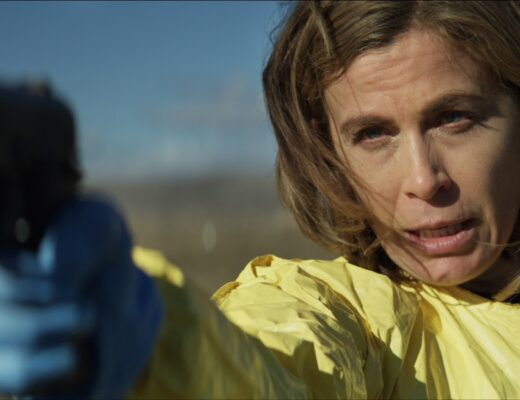Jerzy Skolimowski had a distinctive output well before he ended up in London. He began his film career in his native Poland with three successive features from 1964 to 1966 — Identification Marks: None, Walkover, and Barrier — which acted as semi-autobiographical accounts of his experiences under the communist system. The first two starred Skolimowski himself as his alter ego Andrzej Leszczyc, both relatively rough-and-tumble films featuring a good amount of tracking shots and evocative shadows, while the latter opted for a more surreal and dreamlike aesthetic. These two approaches were effectively fused in his next film Le Départ (1967), a Belgian film starring Jean-Pierre Léaud as an auto-obsessed hairdresser, which inserted into its pleasurably loose progression various ruptures, including a final projector breakdown as effective as its contemporary Persona.
So where does one go after such a decisive break? For Skolimowski, it was to the deep end, or rather, Deep End, his 1970 film and his first effort in the UK. Its focus remains resolutely on Mike (John Moulder Brown), a 15-year-old who gets his first job as a shower room attendant at a public bath, and the object of his burgeoning obsession, his 25-year-old coworker Susan (Jane Asher). Through the midst of this central dynamic runs all manner of unnerving, frankly-presented encounters and characters, including Susan’s fiancé Chris (Chris Sandford), her lover and Mike’s former physical education teacher (Karl Michael Vogler), and all manner of vaguely or sometimes overtly sinister figures in London society.
For Deep End is a film all about sex, or, more specifically, the absolute terror of sexual perversions, and how quickly it can warp the minds of those around it. This is not to say that Skolimowski is a scold or prude by any means: he clearly sees sexuality and comfort with it as a spectrum — albeit within a strictly hetero framework, concerning the characters in this film — wherein Mike and Susan are on roughly opposite ends. Mike is very clearly confused by anyone’s advances as long as they don’t concern the woman of his affections, whereas Susan almost sees sex as an a priori, constantly teasing Mike even as his behavior gets more and more unnerving, though there are certain lines drawn for her: she eventually gets fed up with the constant pestering that various men enact upon her, and she objects when her fiancé drags her to an adult education film.
Like Peeping Tom from a decade before it, Deep End almost sees London as a nightmarish dystopia of sex gone mad, seeing both the bathhouse and the nightlife as a hotbed of strange and unsettling people. Skolimowski’s role here is essentially one of modulation, and he does so by essentially bifurcating the film. The first half of the film largely takes place in and around the bathhouse, leaving aside the trip to the porn theater, and the interactions that Mike has with clients, including an especially memorable one where an older woman repeatedly pushes his head into her breasts while discussing association football.
While sequences like that are willfully extended and acted out in discomfiting long take, the second half takes that strategy and expands it dramatically, first in a 20-minute sequence that follows Mike attempting to spy on Susan and her fiancé, which involves him eating something like ten hot dogs from a Chinese cart owner to give himself a justification for staying in the area, stealing a standee of a nude woman who resembles Susan, and taking refuge with a sex worker with a broken leg, all scored to music from “The Can.” The remaining 25 minutes of the film are taken up by a sequence of even greater absurdity, as Mike and Susan, huddled in the empty pool, boil five large bags of snow in a small kettle and strain it through her stockings in an effort to find her engagement ring’s diamond. What’s emphasized throughout Deep End is the forcefulness of Mike’s teenage fixations, and how they can be expressed in often violent tantrums that go unrecognized until it’s far too late. It’s entirely to Skolimowski’s credit that the final action here is as willfully strange yet visceral as the rest of the film: an almost inexplicable result, augmented by a fundamental damning motivation that resonates with a clanging horror.
Part of Kicking the Canon – The Film Canon.







